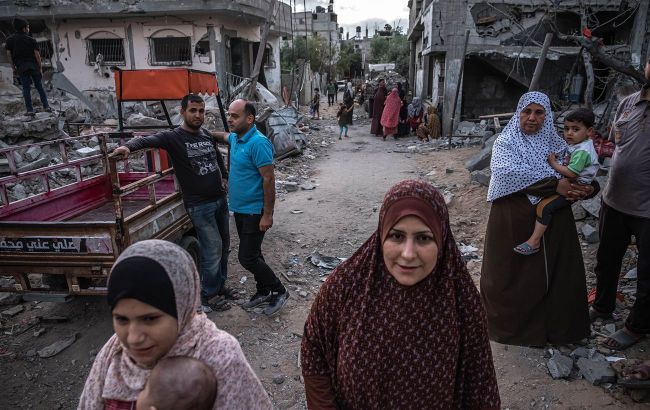'Little over the top': Biden reacts to Hamas' peace deal response
 Photo: Hamas responds to proposed Gaza peace deal (Getty Images)
Photo: Hamas responds to proposed Gaza peace deal (Getty Images)
The Palestinian group HAMAS on Tuesday, February 6, responded to the proposed ceasefire agreement in the Gaza Strip, which also includes the release of hostages. U.S. President Joe Biden described the militants' response as "a little over the top," reports Reuters.
In their statement, the Palestinians responded "in a positive spirit, ensuring a comprehensive and complete ceasefire, ending the aggression against our people, ensuring relief, shelter, and reconstruction, lifting the siege on the Gaza Strip, and achieving a prisoner swap."
A senior representative of HAMAS, Ghazi Hamad, informed the agency that the group aims to release as many Palestinian prisoners in Israel as possible.
The office of the Prime Minister of Israel announced late Tuesday evening that the details of the Palestinian militants' response are being carefully assessed by officials participating in the negotiations.
Meanwhile, U.S. President Joe Biden, while acknowledging some progress in the agreement, referred to HAMAS's reaction as "a little over the top," without specifying further details.
"We're not sure where it is. There's continuing negotiations right now," he said in Washington.
U.S. Secretary of State Antony Blinken promised to discuss HAMAS's response with Israeli officials during his visit to the country on Wednesday.
"There’s still a lot of work to do be done, but we continue to believe that an agreement is possible, and indeed essential," Blinken said at a press conference with Qatar's Prime Minister and Minister of Foreign Affairs, Sheikh Mohammed bin Abdulrahman Al Thani.
Sheikh Mohammed described HAMAS's response as generally "positive" but refused to provide any details.
An anonymous HAMAS representative confirmed to Reuters that the Palestinian Islamist movement would not allow the release of hostages without guarantees that the war would end and Israeli forces would withdraw from the Gaza Strip.
The proposed agreement was developed over a week ago by the heads of American and Israeli intelligence during a meeting with Egyptians and Qataris. It aims to secure the release of the remaining hostages held by militants in Gaza in exchange for a prolonged cessation of hostilities.
Sources close to the negotiations reported that the ceasefire would last at least 40 days, during which militants would release civilians among the remaining hostages. Subsequent stages would involve the handover of soldiers and the bodies of hostages in exchange for the release of Palestinians imprisoned in Israel.
Hostage exchange
Israel launched a military offensive in Gaza after militants from the HAMAS-controlled Gaza killed 1,200 people on October 7 and seized 253 hostages in southern Israel.
The Gaza Ministry of Health claims that at least 27,585 Palestinians have died as a result of Israel's military campaign, with thousands feared buried under the rubble.
Israel's chief military spokesperson Rear Admiral Daniel Hagari reported that 31 of the hostages remaining in Gaza have been declared dead. Earlier, Israel stated that 136 hostages were still being held in Gaza after 110 were released as part of a previous ceasefire reached in November, during which Israel also released 240 Palestinians it had been holding.
Citing an Israeli assessment shared with American and Egyptian officials, the Wall Street Journal reported that up to 50 hostages may be dead, meaning that approximately 80 of the hostages held by HAMAS are still alive.
Palestinians hope that the diplomatic efforts of Blinken will solidify a ceasefire before Israeli forces begin storming the city of Rafah in the south of the Gaza Strip near the border with Egypt. More than half of Gaza's 2.3 million population are hiding in structures mainly made of plastic and tents.
Talks on ceasefire in the Gaza Strip
On February 6, U.S. Secretary of State Antony Blinken embarked on his sixth visit to the Middle East since the outbreak of the conflict between Israel and HAMAS in October 2023. The head of American diplomacy arrived in the capital of Qatar, Doha, where he met with Saudi Arabia's Crown Prince Mohammed bin Salman.
During his visit to Israel at the end of January, Blinken expressed concern about "ongoing" reports of Israeli strikes hitting either humanitarian targets or resulting in the deaths of a significant number of civilians.
Meanwhile, the media reports that the agreement between Israel and HAMAS on a ceasefire and hostage exchange is being delayed due to disagreements within the leadership of the Palestinian movement.

